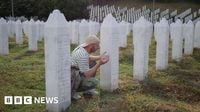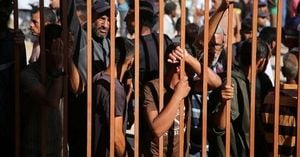On July 11, 2025, the world marks the 30th anniversary of the Srebrenica massacre, a dark and haunting chapter in European history that continues to resonate deeply across Bosnia and Herzegovina and beyond. Over eight harrowing days in July 1995, approximately 8,000 Bosniak men and boys were systematically executed by Bosnian Serb forces under the command of General Ratko Mladić, with the approval of President Radovan Karadžić. This atrocity, now internationally recognized as genocide, stands as the most notorious war crime on European soil since World War II.
The massacre unfolded in the eastern Bosnian enclave of Srebrenica, a town that had become a desperate refuge for tens of thousands of Bosniak civilians fleeing the brutal siege laid by Serb forces. Despite the presence of a lightly armed Dutch UN peacekeeping battalion tasked with protecting the enclave, Mladić’s troops overran Srebrenica on July 11, 1995. The Dutch soldiers were disarmed, and while women, children, and the elderly were forcibly deported, the remaining men and boys were separated, transported to various locations, and mercilessly executed. Their bodies were buried in mass graves, which were later exhumed and reburied in multiple sites in a calculated effort to conceal the scale of the crime.
The International Criminal Tribunal for the former Yugoslavia (ICTY) and the International Court of Justice have since classified the massacre as genocide. Mladić and Karadžić were convicted and sentenced to life imprisonment for genocide, war crimes, and crimes against humanity. Yet, despite these judicial milestones, the legacy of Srebrenica remains fraught with unresolved grief and political tension.
In the years following the massacre, Bosnia and Herzegovina was shaped by the Dayton Peace Agreement, brokered in December 1995 by US Special Representative Richard Holbrooke. This accord ended the Bosnian War but created a deeply complex and fragmented political structure. The country was divided into two entities: the Bosniak-Croat Federation and the Republika Srpska, the latter dominated by Serbs. This division was reflected in a sprawling administrative system consisting of three presidents, 13 prime ministers, 700 members of parliament, and over 180 ministers, governing a population of just 3.2 million. The result has been an often paralysing bureaucracy riddled with ethnic segregation, clientelism, and corruption, hindering economic development and fuelling ongoing societal divisions.
Unemployment remains stubbornly high at 40%, and the population has shrunk by about one-third since its 1990 peak due to war casualties, emigration, and low birth rates. The international community maintains a significant presence through the Office of the High Representative, currently led by German politician Hans Christian Schmidt since 2021. Schmidt wields considerable powers, including blocking legislation and government appointments, yet faces criticism and resistance, particularly from Republika Srpska’s leadership.
Indeed, political tensions remain palpable. Republika Srpska’s president, Milorad Dodik, has pursued policies challenging the Dayton framework, including attempts to withdraw from national institutions and establish a so-called "reserve police force," echoing the paramilitary forces of the 1990s. Dodik’s defiance led to his sentencing earlier this year to a year in prison and a six-year ban from public office, a verdict currently under appeal. Christian Schmidt has called for a stronger international military presence via EUFOR to maintain peace and stability amid these escalating tensions.
These political frictions are mirrored in societal divisions. In Sarajevo, the capital, commemorations for Srebrenica are solemn and widely observed, with hundreds braving rain to honor the victims. The Potočari Memorial Centre and Cemetery, adjacent to the former UN base, remain focal points for remembrance. DNA testing has allowed thousands of families to identify and bury their loved ones, yet hundreds of victims remain missing. On this anniversary, seven individuals identified over the past year—including two 19-year-old men and the only woman in this group, Fata Bektić, aged 67 at her death—will be laid to rest, underscoring the ongoing process of healing and closure.
However, just a short distance away in Republika Srpska, official recognition of the genocide is often denied or downplayed. Political leaders there reject the label of genocide despite the convictions of Mladić and Karadžić, fueling mistrust and obstructing reconciliation efforts. Staša Košarac, Republika Srpska’s foreign trade minister, has criticized the exclusive focus on Bosniak victims, insisting that crimes against Serbs must also be acknowledged. Yet survivors and many citizens see such rhetoric as a barrier to justice and peace.
Amid this fraught landscape, cultural efforts like the play "Flowers of Srebrenica," premiered at Sarajevo’s War Theatre, strive to keep the memory alive and confront the painful legacy. The production portrays the grim realities of July 1995 and the decades of unresolved grief and division that followed, resonating deeply with audiences.
Internationally, the Srebrenica massacre continues to serve as a stark reminder of the perils of unchecked nationalism, propaganda, and inaction. In a joint statement issued on the anniversary, a coalition of European liberal and democratic groups—including ALDE Party, LIBSEEN, and Renew Europe—emphasized the need for justice, democratic reform, and regional cooperation. They warned against the resurgence of nationalist rhetoric and revisionism that threatens peace, drawing parallels with contemporary conflicts such as Russia’s war against Ukraine. The statement called on EU institutions and member states to renew their commitment to the Western Balkans’ stability and integration.
The United Kingdom, which marked its National Srebrenica Memorial Day in June 2025 at St Paul’s Cathedral, reiterated its support for Bosnia and Herzegovina’s efforts to build an inclusive and stable society. Her Royal Highness the Duchess of Edinburgh is scheduled to visit Bosnia during the week of the anniversary to participate in official commemorations at the Memorial Centre. UK officials have condemned divisive rhetoric and secessionist ambitions that threaten the Dayton Peace Agreement, emphasizing the importance of collective responsibility to prevent atrocities like Srebrenica from recurring.
The International Committee of the Red Cross (ICRC) has played a crucial role in the humanitarian response and ongoing search for the missing since the conflict began in 1992. Their painstaking work, including reviewing international archives and witness testimonies, has facilitated the identification of thousands of victims. Among those killed in July 1995 were nine ICRC employees, whose remains have been identified and interred at the Memorial Centre, symbolizing the profound sacrifices made during the war.
As Bosnia and Herzegovina continues to grapple with its past and present challenges, the question of its European Union membership looms large. The Von der Leyen Commission’s decision in 2022 to begin accession negotiations has been met with cautious optimism, yet the country’s complex political fabric and unresolved ethnic tensions pose significant obstacles. The road from the tragedy of Srebrenica to a united European future remains long and arduous.
Ultimately, the memory of Srebrenica is a solemn call to action. It demands vigilance against hatred and division, a commitment to justice, and a steadfast dedication to peace. For survivors, families of victims, and the international community, honoring those lost means striving tirelessly to build a future that safeguards human dignity and prevents such horrors from ever happening again.






